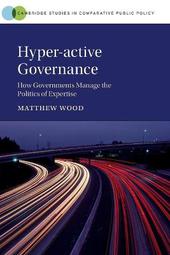
|
Hyper-active Governance: How Governments Manage the Politics of Expertise
Paperback / softback
Main Details
| Title |
Hyper-active Governance: How Governments Manage the Politics of Expertise
|
| Authors and Contributors |
By (author) Matthew Wood
|
| Series | Cambridge Studies in Comparative Public Policy |
|---|
| Physical Properties |
| Format:Paperback / softback | | Pages:288 | | Dimensions(mm): Height 227,Width 150 |
|
| Category/Genre | Political economy |
|---|
| ISBN/Barcode |
9781009001809
|
| Classifications | Dewey:320.6 |
|---|
| Audience | | Professional & Vocational | |
|---|
| Illustrations |
Worked examples or Exercises; 15 Tables, black and white; 14 Line drawings, black and white
|
|
Publishing Details |
| Publisher |
Cambridge University Press
|
| Imprint |
Cambridge University Press
|
| Publication Date |
8 April 2021 |
| Publication Country |
United Kingdom
|
Description
Hyper-active Governance is a new way of thinking about governing that puts debates over expertise at the heart. Contemporary governing requires delegation to experts, but also increases demands for political accountability. In this context, politicians and experts work together under political stress to adopt different governing relationships that appear more 'hands-off' or 'hands-on'. These approaches often serve to displace profound social and economic crises. Only a genuinely collaborative approach to governing, with an inclusive approach to expertise, can create democratically legitimate and effective governance in our accelerating world. Using detailed case studies and global datasets in various policy areas including medicines, flooding, water resources, central banking and electoral administration, the book develops a new typology of modes of governing. Drawing from innovative social theory, it breathes new life into debates about expert forms of governance and how to achieve real paradigm shifts in how we govern our increasingly hyper-active world.
Author Biography
Matthew Wood is Lecturer in Politics and Deputy Director of the Crick Centre at the University of Sheffield. His work focuses on the authority and legitimacy of experts in the field of Governance and Public Policy, and he currently holds an ESRC Future Research Leaders Fellowship 2015-18. His doctoral dissertation (2014) received the Department of Politics' Andrew Gamble prize for best thesis, and his article 'Paradoxical Politics' has recently been awarded the Harrison Prize for best article in Political Studies (2016). He has held visiting fellowships at Universitat Pompeu Fabra, University of Mainz, University of Canberra and Universidad Autonoma de Nuevo Leon, Mexico.
ReviewsAdvance praise: 'Hyper-active Governance makes a timely intervention in contemporary debates about the place of expertise in policy making. This book draws on detailed case studies to question assumptions about the dynamics of technocratic depoliticisation. It offers a novel framework through which to understand how knowledge and expertise are legitimated in the context of hyper-mediatisation and declining trust. It makes important reading for all scholars interested in the relationship between governance and expertise.' John Boswell, University of Southampton Advance praise: 'Experts rule! And can be ruled. Nowadays experts are intrinsic to governance when everyday publics often resent them or are sceptical of their contribution. Governments become 'hyper-active' managing this contradiction. Matthew Wood creates new concepts and builds theory to explain how and why governments seek to maintain their authority when they delegate decisions to experts yet are also compelled to interfere in experts' decisions to shield themselves from public criticism. This book is essential reading for understanding the pathologies of contemporary governance.' Diane Stone, University of Canberra
|